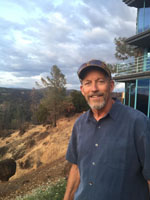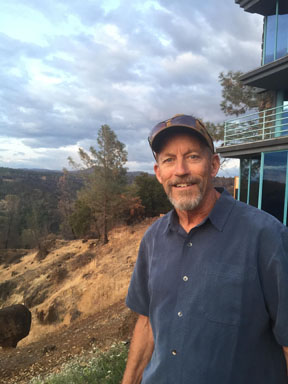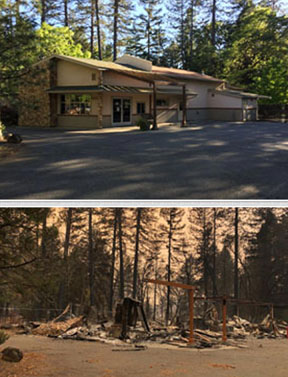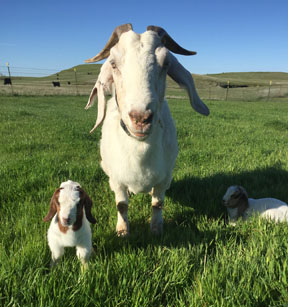
Art Colyer 288

Photo courtesy of Dr. Art Colyer
Dr. Art Colyer has been a companion animal veterinarian in Paradise, California, for 35 years. His clinic and home were destroyed last November by the Camp Fire. He returned to practice in the area by February, and he plans to rebuild his home.
Under stadium lights last Friday night, the Paradise High Bobcats football team kicked off its season to cheers and tears. The majority of players and many in the large crowd lost their homes last November to California's deadliest wildfire. Known as the Camp Fire, it consumed more than 150,000 mountainous acres in Northern California with devastating speed and force, destroying nearly 19,000 structures and killing 86 people. For the game, twice as many spectators as the current population of Paradise turned out. The home opener was celebrated as a sign that the community is back.
Dr. Art Colyer, a veterinarian in Paradise for 35 years, has been a witness to and a building block in that recovery. He lost his home and his clinic to the fire. Within months, he was treating companion animals in a colleague's clinic that escaped the blaze. When he reflects on the fire and the intervening months, he says he is impressed by the public response, inspired by the resilience of fellow residents and optimistic about the future.
Early in the morning of Nov. 8, Colyer was at his clinic as fire approached the town of 26,000 people. "We got the evacuation call at 8, and had to wait for clients and their pets to clear out before we all got out," he said. "I didn't take anything except the backup disk of our records, thinking that we'd probably come back to the clinic to wait it out."
By the time he reached his house across town, nearby structures were on fire. "We (my wife, Joan, and I, and one of our sons who also lived in Paradise and had rushed over to help) grabbed our dogs and cats, a laptop computer, and some files, but our farm animals (11 goats, a pig, and a donkey) were out in a large pasture, and there was no time to round them up and get them into a trailer," he said. "We spent the next four hours in a traffic jam with fire and explosions occurring all around before we were able to finally get out of Paradise."
They spent that night and the next couple of days with other relatives who lost their homes at the house of his daughter and her husband in the larger city of Chico, about a 20-minute drive west. Two days later they were able to return to look for surviving animals. Piles of charred wreckage were all that remained of the clinic and house; however, four of the animals left behind had survived. Two goats, the donkey and the pig apparently found a relatively safe place to ride out the fire. One of the goats, Louie, was badly burned. He was transferred to the University of California, Davis veterinary teaching hospital, which treated him at no charge. After three weeks, Louie was recovered enough to join the other animal survivors. They are currently being cared for by friends at a ranch in Butte Valley, about a 30-minute drive from Chico.
Colyer thinks back on the evacuation with awe.
Colyer clinic before & after 288

Photos courtesy of Dr. Art Colyer
Colyer Veterinary Service is shown before (above) and after the Camp Fire. Today, Dr. Art Colyer practices two days a week out of clinic space rented from a colleague.
"It was amazing to go through that and see, even though it was a completely panicked situation, there was very little panic," he said. "Eighty-five people dying in that fire was tragic, but it was completely a miracle, as far as I'm concerned, that only that many people died."
A relative in Chico had a vacant house for rent. "That's where we landed, which was incredibly fortunate," he said. "It gave us the chance to kind of collect ourselves and figure out what we were going to do."
Within days, Joan Colyer, who is also the office manager, was working the phones — transferring records for clients who had moved out of the area, filling prescriptions, and giving advice. Eventually, they decided it made more sense to find a base of operations in or near Paradise.
Of seven practices that once operated along the 10-mile ridge from Paradise to Magalia, Colyer said, only three didn't burn. By February, Colyer had set up a two-day practice (Thursdays and Fridays) in the Magalia Pet Hospital, a mile northeast of his old location. The owner, Dr. Janice Bremner, practices there Monday through Wednesday.
Many of the employees at Colyer's old clinic have left Paradise, but not all. His associate lost her home and moved out of the area along with four other employees. One veterinary technician, whose home was not burned, and an assistant, who lost her home, have stayed in the area and continued with Colyer.
Clients who've relocated since the fire now travel long distances to see him. Some make the 175-mile trip from San Francisco or drive 90 miles from Redding. "Everyone is spread all around but there are plenty of people who are still around and willing to come," he said.
"Initially, every office call was like a therapy session," Colyer said. "People came in in tears because everybody had to drive through the devastated community to get to us, and a lot of people hadn't been back in the area. So, for the first couple months, aside from the fact that our infrastructure was all screwed up and our communications were terrible and computers weren't working, every call was an emotional rollercoaster. It was hard to get through."
Buttermilk 288

Photo courtesy of Dr. Art Colyer
Five months after the fire, one of the Colyers' two surviving goats, Buttermilk, gave birth to Ash and Blossom. Colyer called the birth "miraculous" because she had not conceived before. She and other does did have the company of a buck in the days before the fire.
Early on, the clinic operated with a WiFi hotspot using cell phones. "Now the infrastructure stuff is starting to come back together, and things are working reasonably well at this point," he said.
Three grocery stores didn't burn and are operational, he said. There are food trucks, and a couple of small restaurants have reopened. There is a curfew between 11 p.m. and 5 a.m. Colyer said this is due to the fact that police and fire services are understaffed.
Most of the wreckage has been hauled away. "It's amazing how quickly the cleanup process has happened," Colyer said. "It really didn't get started until the rain stopped at the end of May, and it's almost all done." In addition, 172 building permits have been issued.
He calls out the Federal Emergency Management Agency for praise, saying it was well-organized, quick and accommodating.
"Now people are much more upbeat," Colyer said. "A lot of the people that come in [with their pets] are making arrangements to come back. So, it's been a really noticeable transition as the cleanup has occurred and it's made a big difference in people's attitudes."
A survey by Urban Design Associates, the firm leading long-term recovery planning for Paradise, found that more than 50% of displaced residents plan to live in Paradise in the future. "How long that is going to take is still anyone's guess," Colyer said, "but it seems to be happening a lot faster than people were originally thinking it would."
Colyer has begun the process of rebuilding his house. At age 66, he's decided it's too late in his career to rebuild the clinic. Still, he is upbeat about the future, saying, "Every cataclysmic event like [the Camp Fire] has potential for changing things for the better if people can continue to persevere."